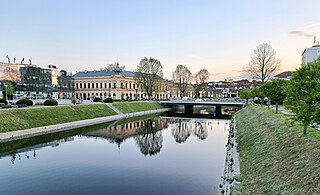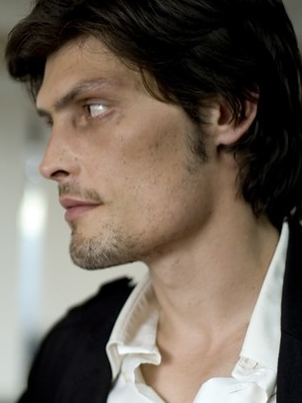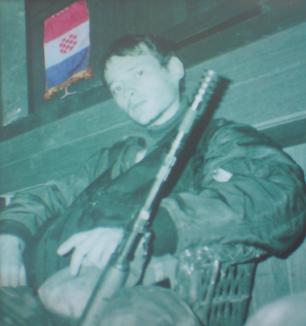
Vukovar is a city in Croatia, in the eastern regions of Syrmia and Slavonia. It contains Croatia's largest river port, located at the confluence of the Vuka and the Danube. Vukovar is the seat of Vukovar-Syrmia County and the second largest city in the county after Vinkovci. The city's registered population was 22,616 in the 2021 census, with a total of 23,536 in the municipality.

Vukovar-Srijem County, Vukovar-Sirmium County or Vukovar-Syrmia County, named after the eponymous town of Vukovar and the region of Syrmia, is the easternmost Croatian county. It includes the eastern parts of the region of Slavonia and the western parts of the region of Syrmia, as well as the lower Sava river basin, Posavina and Danube river basin Podunavlje. Due to the overlapping definitions of geographic regions, division on Slavonia and Syrmia approximately divides the county vertically into north-west and south-east half, while division on Posavina and Podunavlje divides it horizontally on north-east and south-west half.

The Battle of Vukovar was an 87-day siege of Vukovar in eastern Croatia by the Yugoslav People's Army (JNA), supported by various paramilitary forces from Serbia, between August and November 1991. Before the Croatian War of Independence the Baroque town was a prosperous, mixed community of Croats, Serbs and other ethnic groups. As Yugoslavia began to break up, Serbia's President Slobodan Milošević and Croatia's President Franjo Tuđman began pursuing nationalist politics. In 1990, an armed insurrection was started by Croatian Serb militias, supported by the Serbian government and paramilitary groups, who seized control of Serb-populated areas of Croatia. The JNA began to intervene in favour of the rebellion, and conflict broke out in the eastern Croatian region of Slavonia in May 1991. In August, the JNA launched a full-scale attack against Croatian-held territory in eastern Slavonia, including Vukovar.
The Vukovar massacre, also known as the Vukovar hospital massacre or the Ovčara massacre, was the killing of Croatian prisoners of war and civilians by Serb paramilitaries, to whom they had been turned over by the Yugoslav People's Army (JNA), at the Ovčara farm southeast of Vukovar on 20 November 1991, during the Croatian War of Independence. The massacre occurred shortly after Vukovar's capture by the JNA, Territorial Defence (TO), and paramilitaries from neighbouring Serbia. It was the largest massacre of the Croatian War of Independence.
In Croatia, there are over 2,900 people who consider themselves German, most of these Danube Swabians. Germans are officially recognized as an autochthonous national minority, and as such, they elect a special representative to the Croatian Parliament, shared with members of eleven other national minorities. They are mainly concentrated in the area around Osijek in eastern Slavonia.

Stipe Erceg is a German/Croatian actor. He is notable for playing the role of Peter in the 2004 Hans Weingartner film The Edukators alongside Daniel Brühl and Julia Jentsch, as well as the role of Holger Meins in The Baader Meinhof Complex.

The Island of Vukovar is a disputed island on the river Danube. It is situated close to the city of Vukovar, Croatia.
The Velepromet camp was a detention facility established in the final days of the Battle of Vukovar during the Croatian War of Independence. The camp was set up by the Yugoslav People's Army (JNA), which shared control of the facility with Croatian Serb rebels. The facility, originally an industrial storage site, was located on the southern outskirts of the city of Vukovar, in close proximity to the JNA barracks. It consisted of eight warehouses surrounded by a wire fence, and was established on 16 November 1991, when the first detainees were brought there.

Zagreb Film Festival (ZFF) is an annual film festival held since 2003 in Zagreb, Croatia. Focusing on promoting young and upcoming filmmaker, the festival is widely considered to be one of the most important and influential cultural events in Croatia. It also regularly features several international programmes for the filmmaker's first or second films made.

Anti-Terrorist Unit Lučko, also known as the Lučko Anti-Terrorist Unit is the police tactical unit of the Croatian Police stationed in Lučko near Zagreb, the capital of Croatia. Initially distinguishing itself in the Croatian War of Independence, it has gone on to become Croatia's leading police tactical unit. Like all other police units in the country, it is under command of the Ministry of the Interior. It is a member of the ATLAS Network, an association of European police tactical units.
The Dalj massacre was the killing of Croats in Dalj, Croatia from 1 August 1991 until June 1992, during the Croatian War of Independence. In addition to civilian victims, the figure includes 20 Croatian policemen, 15 Croatian National Guard troops and four civil defencemen who had been defending the police station and water supply building in the village on 1 August 1991. While some of the policemen and the ZNG troops died in combat, those who surrendered were killed after they became prisoners of war. They tried to fight off an attack by the Croatian Serb SAO Eastern Slavonia, Baranja and Western Syrmia Territorial Defence Forces, supported by the Yugoslav People's Army and the Serb Volunteer Guard paramilitaries. The SAO SBWS was declared an autonomous territory in eastern Croatia following the Battle of Borovo Selo just to the south of Dalj.

Independent Croatia and Serbia established diplomatic relations on 9 September 1996, following the end of the Croatian War of Independence. From 1918 to 1991, both countries were part of Yugoslavia. They now share 241 kilometers of common border. According to the 2011 Croatian census, there were 186,633 Serbs living in Croatia. According to the 2011 Serbian census, there were 57,900 Croats living in Serbia. Smaller lasting disputes include border disputes over the Island of Šarengrad and the Island of Vukovar. Serbian and Croatian are mutually intelligible standardized varieties of the Serbo-Croatian language and are official in Serbia and Croatia respectively.

Dubravko Merlić is a Croatian journalist, television producer and author, known for his work as an actor, editor and anchor on the Croatian Radiotelevision and Nova TV. He is a winner of the 2007 Rose d'Or award for The Pyramid, a competitive talk show created by Castor Multimedia, a TV production company of which Merlić is currently the CEO.

Fadil Hadžić was a Croatian and Yugoslav film director, screenwriter, playwright and journalist, mainly known for his comedy films and plays. He was born in Bileća in Bosnia and Herzegovina, but mainly lived and worked in Zagreb, with the Croatian and wider Yugoslav productions.
Mile Dedaković is a retired Croatian Army colonel. Also known by his nom de guerreJastreb ("Hawk"), Dedaković is best known for commanding the 204th Vukovar Brigade and the city of Vukovar's defenses during the 1991 Battle of Vukovar in the early stages of the Croatian War of Independence.

Jean-Michel Nicollier was a French volunteer and Croatian soldier in the Croatian War of Independence who was killed in the Vukovar massacre.
The Croatian War of Independence has been the subject of a number of feature films and documentaries. Those include:

The Anti-Cyrillic protests in Croatia were a series of serbophobic protests in late 2013 against the application of bilingualism in Vukovar, whereby Serbian and the Serbian Cyrillic alphabet were assigned co-official status due to the local minority population. The implementation of this decision became mandatory after the 2011 Croatian census, according to which Serbs in Vukovar comprise more than one-third (34.8%) of Vukovar's total population. Signs in the Serbian Cyrillic alphabet had been put up as the Constitutional Act on the Rights of National Minorities mandates bilingual signs in any area where more than one-third of the population belongs to an ethnic minority. This decision became subject of intense agitation by, among others, Croatian war veterans and many ordinary citizens who believe that due to events, particularly the Battle of Vukovar, the city should have been excluded from the application of the law on minority rights, although protests and vandalism have occurred in other towns and cities. The Serbs of Croatia are a minority group that have the narrowest usage of right to bilingualism among all national minorities in Croatia.

The border between Croatia and Serbia in the area of the Danube is disputed. While Serbia holds the opinion that the thalweg of the Danube valley and the centerline of the river represents the international border between the two countries, Croatia disagrees and claims that the international border lies along the boundaries of the cadastral municipalities located along the river—departing from the course at several points along a 140-kilometre (87 mi) section. The cadastre-based boundary reflects the course of the Danube which existed in the 19th century, before anti-meandering and hydrotechnical engineering works altered its course. The area size of the territory in dispute is reported variously, up to 140 km2.

The Serbs of Vukovar are one of traditional communities living in the multicultural, multi-ethnic and multi-confessional eastern Croatian town of Vukovar on the border with Serbia. The Serb community constitutes slightly over one third of the entire population of Vukovar according to 2011 Census. Other significant communities include the Croat majority, as well as Hungarians, Slovaks, Rusyns, Ukrainians and historically Yugoslavs, Germans, Jews, Vlachs and Turks.














